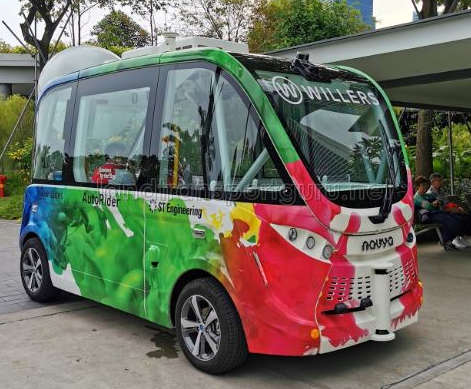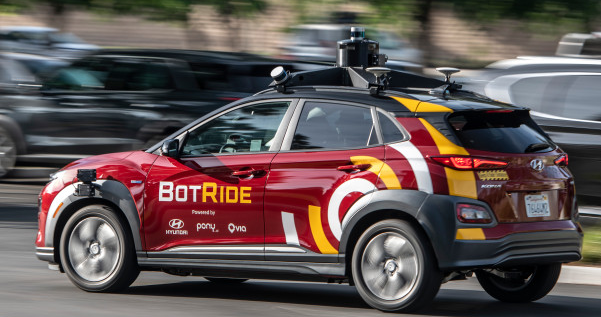From The Editors Many congratulations to Team Flock and their coaches/moms: Joanne and Katherin.
A short video of the team at the competition is
here -- it's recommended viewing -- and more
background on the FLL competition is
here.

Canadian AV News
On November 14, 2019, the City of Toronto issued
a Notice of Intended Procurement for the City’s
Automated Transit Service Shuttle pilot project.
The RFP document will be issued by the City by the end
of November 2019. This pilot project is a collaboration
between the City of Toronto Transportation Services
Division, Toronto Transit Commission (TTC)
and Metrolinx. The project duration will be two
years. More details are available on the City of
Toronto’s website at
this link.The Canadian National Institute for the Blind (CNIB) in collaboration with the University of Toronto and the University of Western Michigan has published a 74-page report titled Understanding the Impact of Connected and Automated Vehicles for Pedestrians who are Blind or Partially Sighted. The report is focused on how pedestrians who are blind or partially sighted will be impacted when Canadian jurisdictions allow fully autonomous vehicles to navigate city streets and highways. This research project was partly funded by Transport Canada’s Advance Connectivity and Automation in the Transportation System (ACATS) program. More information is on the CNIB website at this link. A copy of the report can be downloaded from this link. Autonomous Transportation Canada (ATC) is a new Ontario-based organization with a focus on CAVs. ATC aims to bring together participants in the CAV space and be an advocate for these emerging areas of technology. More information is on ATC’s website at this link. Unmanned Systems Canada (USC) and CAVCOE have jointly announced the 2020 student Unmanned Ground Vehicle (UGV) competition. The format / details / etc. will be basically the same as in 2019, but we will fine-tune things based on the lessons learned. The actual competition will again be held at Invest Ottawa's L5 testing facility in early May 2020. If you are interested -- or know somebody who is -- please write to Barrie Kirk, the Project Manager at ugv@cavcoe.com and we will send you the details. And staying with 2020, the Kanata North Business Association and Invest Ottawa in association with CAVCOE will soon announce the dates for the CAV Canada 2020 Conference. Stay tuned! International AV News The UK-based Centre for Connected and Autonomous Vehicles (CCAV) has asked the Law Commission of England and Wales and the Scottish Law Commission to undertake a far-reaching review of the legal framework for automated vehicles, and their use as part of public transport networks and on-demand passenger services. This is a three-year project running from 2018 to 2021. The Law Commission has already published two consultation papers with a third to be published in 2020. More information and copies of the first two consultation papers can be viewed at the Law Commission’s website at this link. The City of Adelaide, Australia has a population of over 1.3 million people. The University of Adelaide has published a 17-page report titled How Might Autonomous Vehicles Impact the City? The Case of Commuting to Central Adelaide. While the authors believe that AVs are likely to have profound effects on cities, their survey and modelling results suggest that AVs could worsen traffic congestion in the next 30 years or so until a full transition to automated vehicles is achieved. This is partly due to people’s unwillingness to share their rides. More information is at this link. A copy of the report can be downloaded from this link. Can Driverless Vehicles be Profitable? is the title of an article published on October 29, 2019 by Dr. Jeffrey Funk on LinkedIn. The article estimates that up to mid-2019, about US$35 billion has been spent on autonomous vehicle R&D. It enumerates the many challenges in bringing AVs to market and making a profit in doing so. Dr. Funk estimates another US$200 billion to US$300 billion in R&D may need to be spent before AVs become mainstream. The article serves as a counterbalance to the hype associated with AVs. The article can be viewed at this link or this alternative link. The German car maker Volkswagen has announced the foundation of Volkswagen Autonomy (VWAT), a center of excellence for autonomous driving. VWAT will take responsibility for Volkswagen Group activities for the development of self-driving systems from Level 4. It will have bases in both Munich and Wolfsburg, Germany, with a Silicon Valley subsidiary to follow in 2020, and a further subsidiary in China planned for 2021. The initial focus of VWAT will be on commercial vehicles and special purpose vehicles (SPV) such as robotaxis and robovans. More information is at this link. Singapore has launched a commercial automated shuttle system. The service dubbed Auto Rider is a joint venture between CarClub of Singapore, Willers Pte. Ltd. and ST Engineering. The service runs daily from 10:00 AM till 9:00 PM using a modified 10 passenger Navya shuttle. The shuttle has a safety attendant onboard. Tickets cost SGD $5 (about USD $3.70). More information is at this link. A short video can also be viewed at this link.  Back in 2017-2018, Google’s Waymo Business Unit sued Uber for the theft of certain parts of its intellectual property used in self-driving technology. As part of the settlement, both companies agreed to engage an independent software expert of examine if Uber had used Waymo’s technology and to what degree. The software expert has now submitted his report and it is not good news for Uber. More information is at this link. Navigating intersections is a fairly big challenge for automated vehicles. This challenge grows larger if the view of the intersection is obscured by other vehicles or objects. To address this issue, Toyota and the Massachusetts Institute of Technology (MIT) have collaborated to find solutions to this important problem. The research methodology and results are described at this link. Staying with Toyota, its Lexus premium brand is introducing an all-electric model in 2020. This new vehicle is equipped with Level 2 automation to enable it to drive itself from on-ramp to off-ramp on a highway. In common with Ford, GM and others, Lexus believes that a fully automated passenger car is many years away. More information is at this link. Legal and regulatory issues associated with automated vehicles is still a murky area. Thomson Reuters Regulatory Intelligence interviewed Mark Raffman, a lawyer with the Washington D.C. firm of Goodwin Proctor LLP to discuss some of these issues, such as product liability, insurance requirements, cyber security, etc. The interview Q&A can be viewed at this link. Since 2013, Forbes magazine contributor Chunka Mui has written 42 articles on the evolution of automated vehicles. At the beginning, many people were skeptical that AVs would become reality one day. A few years and billions of dollars later, the perception and reality has changed dramatically. All 42 articles published by Forbes over the past 6 years can be viewed on its website at this link. Starting on November 4, 2019, Hyundai launched a robotaxi service dubbed BotRide in Irvine, California. Hyundai has partnered with Pony.ai and Via for this project. Pony.ai provides the self-driving system for Hyundai’s Kona vehicles while Via provides its platform for handling on-demand ride-hailing features such as booking, passenger and vehicle assignment and vehicle identification. Customers will be able to order rides through a smartphone app, which will direct passengers to nearby stops for pick up and drop off. More information is at this link.  Apple co-founder Steve Wozniak was a keynote speaker at a recent conference organized by J.D. Power called the Auto Revolution Conference. Although plugged into the Silicon Valley technology scene, Wozniak is doubtful he will see fully driverless vehicles in his lifetime (he is 69). He cites lacking artificial intelligence as the main culprit. In his words, AI probably isn’t intelligent or flexible enough to be better than even the worst drivers. More information is at this link. Indianapolis Motor Speedway (IMS) is home to the famous Indy 500 races. IMS and its partners are offering US$1.5 million in prize money for an automated vehicle race scheduled for October 23, 2021. The competition is open to universities around the world. According to the president of IMS, there is a fundamental connection between innovations on the racetrack and real-world improvements on the highway. As of this writing, five universities had registered for the competition. They are: Korea Advanced Institute of Science & Technology (KAIST), Texas A&M Transportation Institute (TTI), the University of Florida, the University of Illinois and the University of Virginia. More information is at this link. Actuaries use mathematics, statistics, and financial theory to study uncertain future events, especially those of concern to the insurance industry. Like many other professions, the actuaries have automated vehicles on their radar from a risk assessment viewpoint. The Society of Actuaries has published a 21-page report dealing with this subject. The report identifies eight major trends as well as policy and technology trigger points that could impact the development and deployment of automated vehicles. A copy of the report can be downloaded from this link. Dubai’s Road & Transport Authority organized a major self-driving conference in Dubai from October 15th to 16th 2019. Many automated shuttles designed for public transport purposes were on display at this conference. A report by CNN describes these shuttles and has photos of 15 of them. The report and photos can be viewed at this link. One of the downsides of automated vehicles is the likely loss of driving jobs. This includes many long-distance truck drivers. Ike Robotics, which specializes in truck automation technology, has produced a presentation focusing on the impact of truck automation on jobs and how automation may make the lives of truck drivers easier by making the long stretches of highway driving driverless and having truckers do the more complex part of the journey on either end. Some other firms have employed experienced truckers for monitoring a truck’s operation remotely from a control centre. The presentation can be viewed at this link CAVCOE Speakers' Bureau CAVCOE provides speakers for many different types of events across Canada, the US and overseas. This keeps us busy because everybody understands that CAVs will have an impact on almost everything. On the one hand, our presentations have core messaging on the status of CAVs, their deployment scenarios, and the impact on business plans, government policy, regulations and society as a whole. On the other hand, each presentation is customized for the audience and the time available. To enquire about a speaker for your event, please write to speakers@cavcoe.com Dec. 11, 2019: Innovations in Mobility & Transportation, presented by Caliber/SAE, Vancouver, BC Jan 7-10, 2020: CES 2020, Las Vegas NV Apr 2-7, 2020: Transportation Association of Canada, Spring Technical Meetings, Ottawa ON
Jun 14-17, 2020:
ITS Canada 2020 Conference. Edmonton AB
TBA, 2020: CAV Canada 2020 conference, Ottawa ON |
|||||
|
AV Update
is a free, monthly roundup of news and analysis in the
world of automated vehicles and their impact on
the private sector,
government and society.
Chief Editor: Ahmad Radmanesh Contributor to this issue: Barrie Kirk To subscribe, click here. To unsubscribe, click here. We welcome all comments; please send them here © CAVCOE 2019 CAVCOE (formerly the Canadian Automated Vehicles Centre of Excellence) provides advice to public and private sector organizations to help plan for the arrival of self-driving vehicles |
